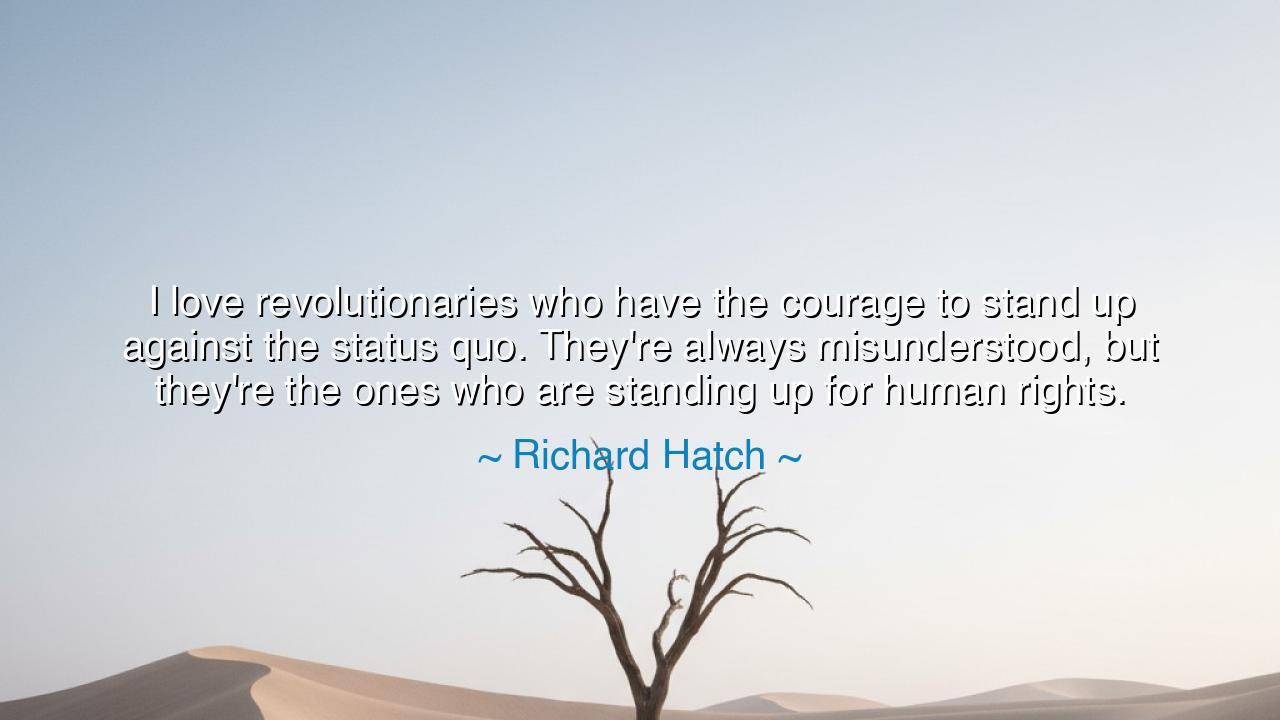
I love revolutionaries who have the courage to stand up against
I love revolutionaries who have the courage to stand up against the status quo. They're always misunderstood, but they're the ones who are standing up for human rights.






“I love revolutionaries who have the courage to stand up against the status quo. They're always misunderstood, but they're the ones who are standing up for human rights.” Thus spoke Richard Hatch, actor and thinker, whose words carry the pulse of those who defy conformity and ignite change. His reflection burns with admiration for the revolutionary spirit, that sacred fire which has propelled humanity from the darkness of tyranny into the light of freedom. To stand against the status quo is no small act—it is to stand against comfort, against fear, against the crushing weight of what the world calls “normal.” And yet, it is these souls, these restless dreamers and defiant hearts, who move the ages forward while the timid cling to the familiar.
The origin of this quote lies in Hatch’s lifelong fascination with human struggle—on screen and off. Known for his portrayal of leaders who fought for survival and justice, his admiration for real-life revolutionaries flowed from the same source: a love for truth and an intolerance for apathy. When he speaks of those who “stand up against the status quo,” he speaks of those rare few who choose conscience over comfort, who bear the cost of being misunderstood because they see beyond the horizon of their time. Such people are the bridge between what humanity is and what it may yet become.
To stand against the status quo is to awaken while others sleep. It is to challenge customs so ancient that they have become invisible, to question systems so powerful that they are mistaken for destiny. Every true revolutionary is, in essence, a seer—one who perceives injustice not as inevitable, but as intolerable. Yet, as Hatch reminds us, these visionaries are seldom welcomed. The misunderstood are mocked as heretics, traitors, or fools, for their truths arrive before the world is ready to receive them. So it was with Socrates, condemned for corrupting the youth of Athens; so it was with Galileo, imprisoned for saying the earth moved around the sun; so it was with Martin Luther King Jr., who dreamed of a world where the color of one’s skin no longer chained the soul.
Consider the story of Nelson Mandela, who spent twenty-seven years in prison for daring to defy the brutal machinery of apartheid. To the world of his day, he was a rebel, a disturber of order; yet to history, he stands as a giant of humanity. His courage did not spring from anger but from conviction—the belief that justice was worth every sacrifice. He endured isolation and pain not for personal glory, but for human rights, the sacred inheritance of every man and woman. When he walked free, he bore no bitterness, only resolve. Through his endurance, the moral law triumphed over man’s cruelty. Mandela’s life is the embodiment of Hatch’s words: misunderstood by his age, yet immortalized by truth.
This is the paradox of the revolutionary—he who is hated in his lifetime and honored in eternity. The world resists those who disturb its peace, yet later kneels at their graves. The status quo, that slumbering beast, fears awakening; it resents the mirror held before it by those who dare to question. But without such questioning, civilization would rot from stagnation. The revolutionary, then, is not the destroyer of order, but the midwife of a better one. His rebellion is not born of hatred, but of love—love for justice, for humanity, for the promise of a world made whole.
The lesson, dear listener, is this: do not fear being misunderstood when you stand for what is right. The path of truth is seldom paved with approval. If your heart burns with the desire to defend the voiceless, to challenge cruelty or deceit, walk that path with courage. You may lose favor; you may walk alone. But know this—the eyes of history are upon you, and the echoes of your integrity will outlast the clamor of your critics. Human rights are not gifts granted by governments—they are eternal principles upheld by the brave.
To live by Hatch’s wisdom, begin where you stand. Speak truth in small matters so that you may have the strength to speak it in great ones. Question injustice wherever you see it. Do not let fear of ridicule silence your conscience. The status quo may seem mighty, but even empires crumble before the persistence of one honest voice. When you defend dignity, equality, and compassion, you become part of a lineage stretching back to every soul who has ever defied oppression.
So remember, as Richard Hatch reminds us: to stand up for what is right is the noblest act of all. Let your life be a quiet revolution, guided not by rage but by righteousness. The misunderstood today become the teachers of tomorrow. Therefore, live boldly, speak honestly, and love deeply—for the fate of the world has always rested in the hands of those who dared to rise when others remained still.






AAdministratorAdministrator
Welcome, honored guests. Please leave a comment, we will respond soon